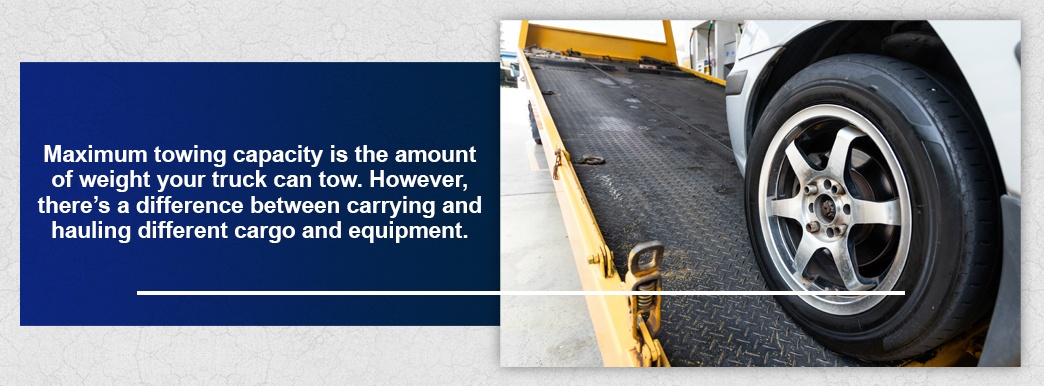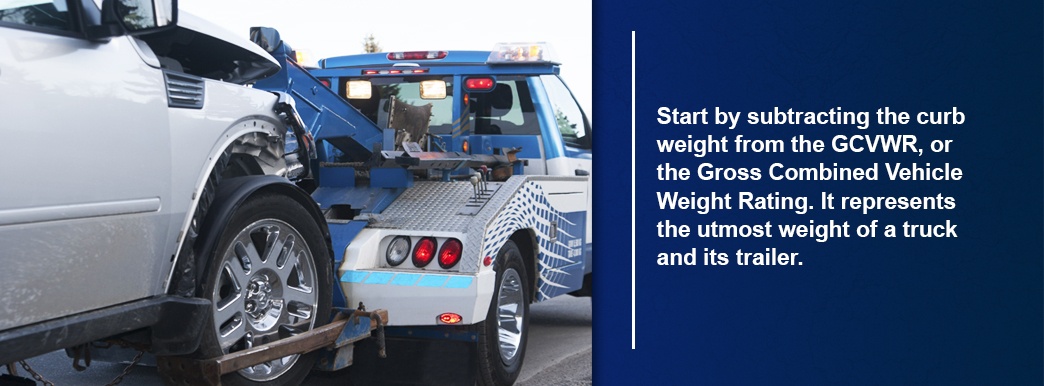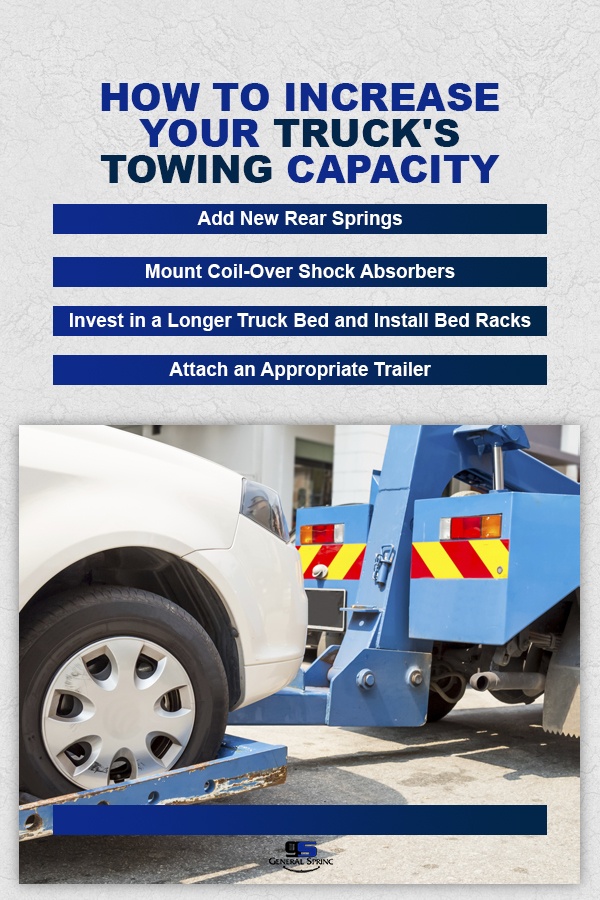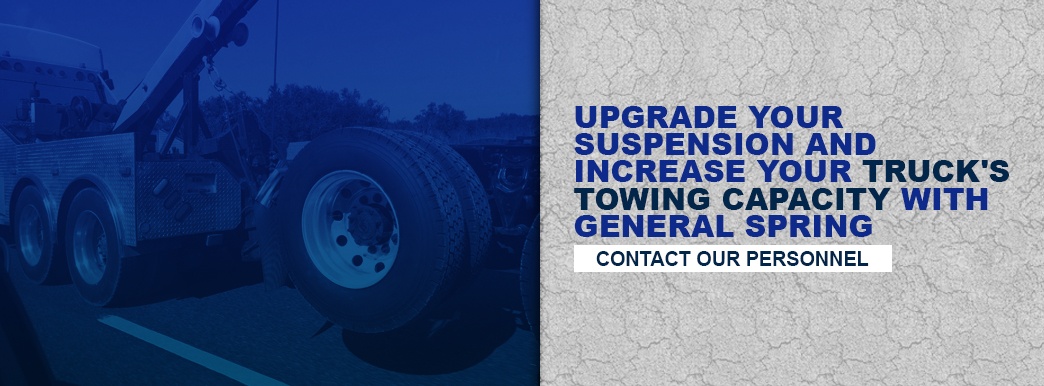Dec 6th 2020
How Much Weight Can My Truck Tow?
How Much Weight Can My Truck Tow?

When you're in the market for a trailer, RV or another piece of heavy machinery, you need to know if your pickup can handle the load. The maximum towing capacity of your truck ranges, depending on the configuration of your vehicle. Unless you opt for all the upgrades and highest-rating options, your rig will have a tow rating that’s specific to its components.
It can be challenging to determine the exact towing capacity of your truck, so General Springs is here to give you insight on various terms, calculations and ways to modify your vehicle to withstand your towing expectations.
What Is Towing Capacity?
Maximum towing capacity is the amount of weight your truck can tow. However, there’s a difference between carrying and hauling different cargo and equipment.

For example, think about carrying a box vs. pulling a sled. You’re able to handle more weight by using one motion compared to the other. Similarly, a truck’s tow rating often exceeds its payload capacity because most of the weight rests on the trailer’s axels instead of the vehicle’s.
Towing ability is how heavy your trailer can be after adding your load. Various factors can affect how much a truck can pull, such as:
- Axle ratios
- Chassis
- Engine
- Frame design
- Hitch class and type
- Horsepower
- Load ratings
- Suspension
- Tires
- Torque
- Trailer
- Transmission
- Two vs. four-wheel drive
Alternatively, the payload is the total amount of weight a truck can haul in its bed and cab that’s determined by the manufacturer. The payload is how much weight you can add to the truck, on top of its curb weight.
To determine your truck's maximum towing capacity, you'll need to examine the various weight ratings:
- Gross Vehicle Weight Rating (GVWR): GVWR is the total weight of the passengers, cargo, fuel and vehicle without a trailer attached. It’s a maximum rating determined by a truck’s manufacturer. It can also refer to the max weight of a trailer.
- Gross Combined Weight Rating (GCWR): GCWR is the weight of a loaded trailer in combination with the total weight of a truck, plus its passengers and cargo.
- Gross Axle Weight Rating (GAWR): GAWRD considers the greatest weight allowed over each axle. FR represents the front rating, while RR is the rear rating.
- Gross Trailer Weight (GTW): The total weight of a trailer, plus its cargo, determines the maximum GTW. It’s more like a measurement, rather than a rating, you take when placing a loaded trailer onto a vehicle scale.
Other terms to keep in mind include:
- Curb Weight: Curb weight is the measurement of a truck without additional cargo and passengers, but includes the weight of the rig’s fluids.
- Hitch Weight: Hitch weight is how much weight a trailer hitch can withstand.
- Dry Weight: Dry weight is the total weight of a vehicle without passengers, cargo or fluids present.
- Tongue Weight (TW): Tongue weight is the direct force a trailer places on a hitch. Depending on the position of the cargo in the trailer, it can affect the TW. Tongue weight also helps maintain control of the rig and should be 10 to 15 percent of the trailer’s total weight.
If you have too much tongue weight bearing down on the hitch ball, your truck can sink in the rear. It can affect the front wheels by inhibiting braking, steering, traction and suspension operations. Too little TW can cause fishtailing or swaying of the trailer.
The height of the hitch also plays a role in the truck’s braking ability and tongue weight. The trailer should be level to the vehicle. If needed, adjust the hitch to the appropriate height. You will need to factor in the rig’s TW into its payload capacity because it also affects how much weight you can place in the bed and cab.
It’s vital to know what your vehicle can handle to avoid damage to your trailer, truck and cargo.
How to Determine Your Truck's Maximum Towing Capacity
Calculating how much weight your truck can tow will vary depending on your specific make and model. Check your manufacturer’s manual, the driver-side door jamb or the manufacturer’s online guide for your rig’s towing capacity.
The most accurate way to determine your truck’s various weights is to look at the VIN or vehicle identification number. Manufacturers often make exciting statements about a truck’s potential towing capacity without relaying the fine print. A vehicle needs a specific configuration to attain the model’s top capacities.
For example, let’s say a 2019 full-sized pickup truck's towing capacity is between 5,000 and 13,200 — a massive range of uncertainty that is contingent on each configuration. You can also choose to calculate the towing capacity by comparing your truck’s weight ratings to the trailer’s gross weight.

Start by subtracting the curb weight from the GCVWR, or the Gross Combined Vehicle Weight Rating. It represents the utmost weight of a truck and its trailer. To find the GCVWR, add the gross vehicle weight rating with the vehicle’s loaded trailer weight:
GVWR + Loaded Trailer Weight = GCVWR
Then, you can determine your truck’s towing capacity:
GCVWR – Curb Weight = Towing Capacity
Figuring out your vehicle’s truck towing capacity is similar to finding the maximum payload capacity. Check the owner’s manual or calculate it on your own:
Gross Vehicle Weight – Curb Weight = Payload Capacity
Before you start a trip, take your truck and trailer to a weigh station. Determine the total weight of both units, then weigh your vehicle separately. Once you know the maximum towing and payload capabilities of your rig, you can safely load it with a range of materials, like camping equipment and all-terrain vehicles.
The tow rating may seem simple, but a handful of factors contribute to how much your truck can handle. Always make sure your vehicle doesn’t exceed its gross vehicle weight rating and that the truck, plus the trailer, don’t go over the gross combined weight rating.
What Happens If You Exceed Your Towing Capacity?
If your truck tow ratings are higher than the weight of the trailer, you’re good to go. But if the weight of the trailer exceeds your vehicle’s ratings, you should not hitch the equipment. You should only tow as much weight that’s rated for your rig according to the manufacturer’s standards.
For example, if your truck can only haul 8,000 lbs., but your hitch can support 10,000 lbs., you can’t exceed the lesser value. Towing more weight than what the system allows is dangerous and can affect different vehicle components.
Under towing your rig can lead to accidents because of dangerous swaying, which can cause the trailer to swerve back and forth across lanes. In more severe cases, the trailer can connect with other cars on the road.
Overhauling has the potential to damage the following:
- Engine
- Transmission
- Frame
- Tires
If the weight of the trailer consistently undergoes overloading, the leaf springs can experience emanate problems, such as excessive early wear, fracturing and cracking, and failure. Tire blowouts can also be a result. Too much weight can place excessive force and stress on your truck, while also causing unsteady acceleration, braking and steering. Sometimes, overhauling can cause the vehicle to turnover.
Transmission failure can occur when you collide with potholes, bumps and debris. Hazards can pose as a threat to overloaded rigs by forcing the chassis to sink — sometimes scraping the pavement — which leads to severe mechanical disasters.
If you’re pulling the right load weight with proper stability, it increases your safety and can help prevent accidents. You never want to compromise the capacity of your truck or trailer if you’re going to sustain a secure and efficient haul.
State laws also vary when it comes to towing regulations. Make sure you research your state’s laws, as well as other areas you may be traveling. You will require the correct licensing and a complete understanding of towing laws. Some states demand specific speed limits, while others consider different certifications.
How to Increase Your Truck's Towing Capacity
What do you do when you want to tow more than your truck can handle? By adding the proper modifications that match your truck’s ratings, you can distribute weight more efficiently. Begin by knowing the towing capacity of your truck and how many pounds you want to increase it by.

If you’re looking to increase its capacity by several thousand pounds, you will need to invest in a more heavy-duty truck. However, smaller increments are more obtainable. To boost the towing capacity of a truck, you could:
Add New Rear Springs
Improving the suspension unit is the most common upgrade to support numerous towing applications. Enhancing the suspension can prevent riding up and dragging. Instead of conducting a complete overhaul of the system, you can upgrade the leaf springs.
Your truck’s weight is equally distributed on four suspension springs, but the rear springs undergo more pressure when a trailer is attached. Improving the rear springs — leaf and coil — is essential if you plan on hauling more significant items.
A leaf spring's strength is determined by how many springs are on the unit. The most common ones have three or four contoured parts and a single, supportive leaf on the bottom. You can add extra leaves to each side of the rear suspension to enhance support, which can help you reach the maximum payload. Or, you can choose to replace the leaf units with a higher grade kit. Make sure to invest in the right leaf springs by knowing how much they can hold.
Leaf springs keep your truck’s body elevated when hauling a load or pulling a trailer. Each of the four units helps the rig’s suspension adjust, depending on the capacity, to keep it at the correct height and position. Leaf springs also create a smoother ride for you and your equipment.
According to research, leaf springs are expected to grow within the global market by 1.3 percent by 2024. The industry will continue to undergo technical innovations with high-performing solutions and new materials.
Thickness determines the strength of coil springs. You can replace your current ones for thicker versions or leaf springs. Suspension upgrades with leaf or coil springs are simple to install.
Mount Coil-Over Shock Absorbers
Mounting coil-over shock absorbers helps diminish any unsteady movements when hauling or towing heavy weight. They limit sway and increase stability by reducing vibrations to make for a safer and more comfortable ride. While coil-over shock absorbers won’t increase your vehicle’s payload or towing ability, the upgrades can help you max out the payload.
Invest in a Longer Truck Bed and Install Bed Racks
If you want to maximize your existing payload, you can extend the truck’s bed, giving you more room. An extended bed is ideal for hauling, while shorter versions are better for daily commutes. The improvement also distributes the truck’s weight better. When you apply bed racks to your truck, they increase the amount of space in the bed as well.
Attach an Appropriate Trailer
The size of a truck’s bed and payload capacity determines the amount of weight you can place in the back. But towing capacity is not limited by those factors. Instead, adding a trailer can extend your truck’s payload, sometimes doubling it. Working with an enhanced suspension will eliminate sag and drag and build extra hauling space. You can also upgrade your trailer springs.
Other components that can profit from modifications are your brake pads and rotors. Make sure your braking system can handle more weight. You may want to apply a trailer brake controller as well. Four additional adjustments you can augment to your truck’s towing capacity include:
- Installing a better exhaust system.
- Adding a new programmer for increased horsepower and torque.
- Using the right trailer hitch that meets safety standards and load.
- Applying a larger radiator to support your engine to provide less strain.
While implementing several revamps may not allow you to pull more weight, the process will enable you to reach your maximum towing capacity.
Upgrade Your Suspension and Increase Your Truck's Towing Capacity With General Spring
General Spring specializes in leaf springs, coil springs, load support and other suspension upgrades. We provide solutions to support your truck’s towing capacity, whether you’re transporting heavy equipment or a trailer full of material. Our experts can customize leaf springs for a range of applications, as well as older vehicles. We deliver a one-year warranty on leaf springs and fast shipping.

Shop our available leaf springs by the make and model of your truck or contact our personnel for additional support. Since 1965, General Springs has been an authority in suspension and leaf spring upgrades to help maintain your towing applications.
